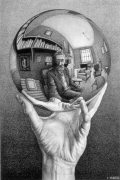Marshall McLuhan summarized his view of the media in a model called the tetrad of media effects. The tetrad asks the following four questions about any medium to evaluate its qualities.
1) What does the medium increase? For example, TV amplifies the view of the whole world from our homes.
2) What does the medium make obsolete? TV makes family communication obsolete.
3) What does the medium retrieve that had been obsolete earlier? TV provokes a re-tribalization and homogenization of cultures.
4) What does the medium turn into when pushed to extremes? TV can turn in a global Big Brother show where everybody is on the airwaves. TV as well can become a tool of social manipulation.
The number and role of the media in our lives having expanded exponentially since McLuhan’s times, both in terms of the time we dedicate to them and the scope of their applications in our lives, we need to probe the media with a broader range of questions.
I won’t consider the computer and Internet as individual media since they are sums of several media, both traditional and new. Using a computer to write, shop, program software, look at porn or read news are different modalities which involve different needs, though they share the same tool.
[/en][it]
Marshall McLuhan sintetizzò le sue idee sui media in un modello chiamato la tetrade degli effetti dei media. La tetrade usa le seguenti quattro domande per valutare un medium:
1) Cosa permette di espandere il medium? Per esempio, la TV amplifica l’immagine che abbiamo del mondo dalle nostre case.
2) Cosa rende obsoleto? La TV rende obsoleta la comunicazione all’interno della famiglia.
3) Cosa recupera che era divenuto obsoleto in precedenza? La TV provoca una ri-tribalizzazione e un’omogeneizzazione delle culture.
4) Cosa succede quando i limiti del medium vengono spinti agli estremi? La TV può trasformarsi in un unico Grande Fratello in cui la vita di ognuno è in diretta. La TV può anche diventare uno strumento di manipolazione sociale.
Poiché oggigiorno il numero e la funzione dei media si sono espansi in misura esponenziale rispetto ai tempi di McLuhan – in termini sia di tempo che dedichiamo a essi sia di loro ricadute nella nostra vita – abbiamo bisogno di vagliarli tramite più domande.
Non considererò i computer e Internet come media singoli, in quanto sono la somma di diversi media, sia tradizionali che nuovi. Usare un computer per scrivere, fare acquisti, programmare, guardare pornografia o leggere notizie sono modalità diverse che rispondono a bisogni diversi, benché usino lo stesso strumento.
[/it]
Leggi tutto “Questions about the media”


